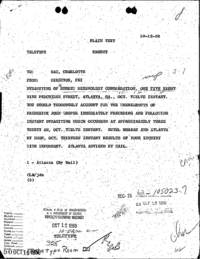John Kasper
John Kasper (1929–1998) was a Ku Klux Klan member and segregationist who took a militant stand against racial integration during the civil rights movement.
Life

Educated at Columbia University, Kasper became a devotee of Ezra Pound[1] and corresponded with the poet as a student.[2] Between 1950 and 1963, Kasper sent 400 letters to Pound and received an unknown number of replies (Pound's letters to Kasper are lost). In the letters Kasper identifies with Pound and, within a short time of beginning the correspondence, he considered himself Pound's main disciple.
Directed by Pound, Kasper started a small press (Square Dollar Press) in 1951, to publish works Pound favored. In 1953, Kasper opened the Make it New bookshop in Greenwich Village, displaying Pound's letters in the shop window. Kasper campaigned against racial integration in the Southern United States, calling it a Jewish plot. In those activities and others, Kasper believed he was disseminating the poet's ideas. Pound's association with Kasper caused chagrin among those who were attempting to have Pound released from St. Elizabeths Hospital, where he was incarcerated on charges of treason.[3]
After running a bookshop in Greenwich Village, Kasper moved to Washington, DC, where he befriended Pound and set up a company to publish the poet's works, as well as those of others such as Charles Olson.[2] Imbibing Pound's right-wing ideas, Kasper formed the Seaboard Citizens Council immediately after the ruling of the Supreme Court in the Brown v. Board of Education case, with the aim of preventing desegregation in Washington.[4]
Arrest and acquittal
Kasper came to prominence during the integration of Clinton High School in Clinton, Tennessee. He sought to mobilize the opponents of the desegregation order, and was arrested during the resulting unrest.[1] Kasper was acquitted in the subsequent trial, that included a number of jurors who served on the arresting auxiliary police force.[5]
Arrest and conviction
As a result of this incident, Kasper became a focal point at a number of such protests across the Southern United States, often an unwelcome one.[6] While he was campaigning, Kasper was jailed for crimes ranging from inciting a riot to loitering.[2] He was a suspect in a school bombing in Nashville as well as a number of synagogue bombings—he was a virulent antisemite—although no evidence was provided to link him directly to any of the cases.[2]
In 1956, he was under a court order to desist, which he ignored, prompting his arrest and conviction for contempt of court. He was found guilty, appealed and lost. he was then sentenced to one year in jail.[7] He served eight months for conspiracy in 1957.
Upon his release, he called for a return to Constitutionalism, and the creation of a third party to oppose the integration that was now supported by both Democrats and Republicans.[2] He became associated with the National States' Rights Party and ran in the 1964 Presidential election with J.B. Stoner as his running mate. Kasper attracted negligible support: just 6,434 votes in just two states, Kentucky and Arkansas.[8]
Kasper returned to his northern roots in 1967 and effectively left politics, settling down to family life and a series of clerical jobs.[2]
References
- "JAIL TERM UPHELD FOR BIAS LEADER: Kasper, Foe of Integration, Loses Appeal in Tennessee School Disorders Case Details of the Ruling Faces Another Trial". The New York Times. 2 June 1957. p. 57. ProQuest 114221213.
- 'The Tale of John Kasper'
- Houen, Alex. (2010). Anti-Semitism. Ira B. Nadel (editor), in Ezra Pound in Context. Cambridge: Cambridge University Press. ISBN 978-0-521-51507-8. pp. 397-398
- Demetres P. Tryphonopoulos; Stephen Adams (2005). The Ezra Pound Encyclopedia. Greenwood Publishing Group. p. 9. ISBN 978-0-313-30448-4. Retrieved 24 June 2012.
- 'Mr. John G. Moore on the Desegregation of Clinton High School' Archived 2008-03-15 at the Wayback Machine
- 'Kasper Not Wanted In Arkansas' from the Arkansas Democrat-Gazette Archived May 18, 2006, at the Wayback Machine
- | June 1, 1957 | John Kasper, Appellant, v. D. J. Brittain, Jr., et al., Appellees, 245 F.2d 92 (6th Cir. 1957) | Annotate this Case | US Court of Appeals for the Sixth Circuit - 245 F.2d 92 (6th Cir. 1957) |
- 'Popular Votes for John Kasper (most recent) by state'
External links
John Kasper's FBI files obtained through the FOIA and hosted at the Internet Archive
- FBI headquarters files part 1
- FBI headquarters files part 1-1
- FBI headquarters files part 2
- FBI headquarters files part 2-2
- FBI headquarters files part 3
- FBI headquarters files part 3-3
- FBI headquarters files part 4
- FBI headquarters files part 4-4
- FBI headquarters files part 5
- FBI headquarters files part 6
- FBI headquarters files part 7
- FBI headquarters files part 8
- FBI headquarters files part 9
- FBI headquarters files part 10
- FBI headquarters files part 11
- FBI headquarters files part 12
- FBI headquarters files part 13
- FBI headquarters files part 14
- FBI headquarters files part 15
- FBI headquarters files part 16
- FBI headquarters files part 17
- FBI headquarters files EBF18
- FBI headquarters files EBF49
- FBI headquarters files EBF321
- Knoxville office files part 1
- Knoxville office files part 2
- NYC office files part 1
| Preceded by Orval Faubus |
National States' Rights Party Presidential candidate 1964 (lost) |
Succeeded by none |